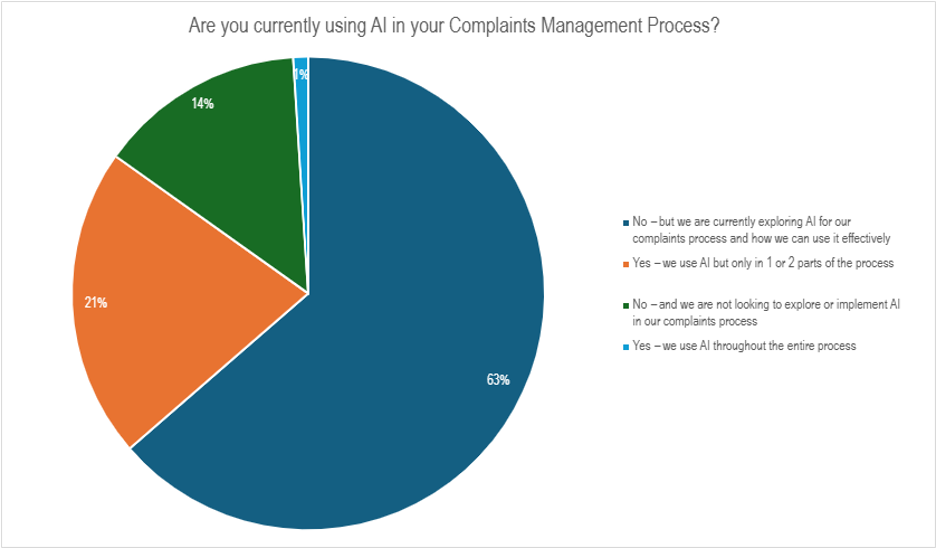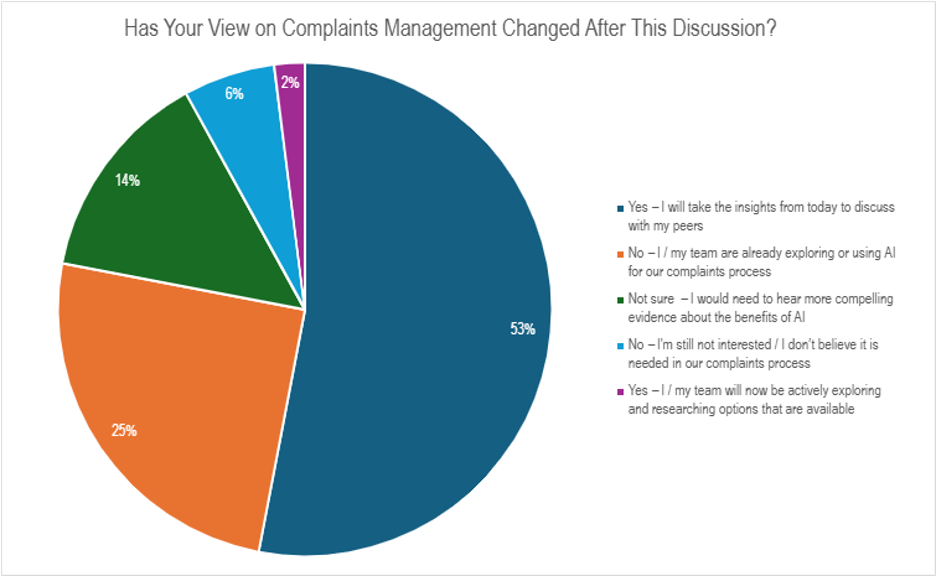Insights Into the Future of Complaints Management With AI
Insights Into the Future of Complaints Management With AI
Insights Into the Future of Complaints Management With AI
17 Juin 2025
 Aptean Staff Writer
Aptean Staff Writer 
Artificial intelligence (AI) is reshaping complaints management, from streamlining operations and accelerating response times to transforming the way customers and organisations interact with each other. As technology continues to rapidly develop, how can your business ensure it navigates this new future to deliver success?
In our latest webinar, we brought together industry leaders in our Aptean Respond Complaints Working Group (CWG) to share practical insight into how financial services, insurance and public sector teams can balance AI’s efficiency with the empathy customers expect.
Here are the key takeaways from the session which covered the current state of complaints management, the challenges of adopting AI and the opportunities to transform complaints handling.

The Current State: Manual, Fragmented but Ripe for Change
AI may be dominating conversations across many industries, but the majority of complaints teams are not making use of it.
A poll taken during the session showed that 77% of attendees aren’t currently using AI in their complaints process. However, the majority of those respondents are actively exploring its potential for their organisation, highlighting a clear curiosity for the benefits it could bring.
Why? Because the pressure to fix fragmented and inefficient processes usually beats the fear of technological or process changes. As a webinar attendee from the motor finance industry highlighted: “the sheer volume of data and claims and complaints coming through has meant that we've had to use AI for sorting and logging. It's not currently used in any of the decision-making processes. But we're certainly investigating that.”
Inefficiencies impact the speed, consistency and quality of your outcomes—posing serious challenges in heavily regulated sectors like finance and insurance. By overcoming any internal reluctance and applying AI capabilities now, you can streamline your complaints process, reduce resolution time and still stay fully compliant.
AI Adoption: The Transparency Challenge
Interest in AI is growing but so are the challenges of implementing it effectively. For many organisations, the first step is to define AI’s role in the complaints process and ensure this is clearly communicated to customers.
As the webinar’s guest speaker, Tristan Harper, Principal Data Scientist at Aviva, put it – transparency is key: “It’s important to be transparent about where we use AI and generative AI in our processes.”
Communication doesn’t stop at where AI is being used, it also needs to cover decisions and determinations. The Financial Conduct Authority (FCA) has been clear in its stance: organisations must be able to explain how decisions are being reached when AI is involved, and evidence the rationale behind outcomes.
This level of transparency is crucial to build customer trust and demonstrate compliance with strict regulations. As AI becomes more embedded in complaints handling, your ability to clearly show how decisions are made, and to justify them, will be essential.
The Complexity of Human Empathy in Complaints Management
Some organisations have already begun to introduce AI into their complaints processes— to draft final response letters or assign cases to correct workflows. AI adds speed and structure to complaints handling, but it isn’t flawless, so human oversight remains essential.
A webinar attendee from the insurance industry shared their approach: “The colleague will write up their final response letter and put it through AI to make any amendments, but they will always check it before it is sent out to a customer.”
While these early steps signal progress, there is one fundamental limitation of AI: it cannot replicate human empathy.
As one person who works in a complaints team pointed out: “we've seen how it's responses can be kind of robotic, it can't seem to process the emotion.” And in complaints management, where customer experience is everything, this is a serious limitation.
Empathy becomes even more significant when dealing with vulnerable customers and sensitive circumstances. In those moments, your business needs to find a balance between AI efficiency and the emotional intelligence required to make communications and outcomes fair and appropriate.
Reimagining Complaints Management: Data-Driven, Insightful and Human-Centric
When used strategically, AI can be a powerful tool to improve your complaints function through greater efficiency, better data insight and allowing your team to focus on more valuable areas, such as building great customer relationships, rather than repetitive or admin-heavy tasks.
One area that several webinar attendees pointed to as an area where AI can deliver immediate impact is root cause analysis. By identifying recurring patterns and common issues across large volumes of data, AI allows your organisation to move beyond reactive resolution and take steps towards proactive prevention—reducing complaint volumes and improving customer experience.
An often overlooked, but vital aspect of AI effectiveness is prompt engineering. The way a prompt is framed directly affects the accuracy and usefulness of the AI’s output.
Tristan underlined this point clearly: “How you're prompting your AI to look for things and making sure that you're being quite explicit around what you want to do, is well worth being aware of.”
As AI continues to evolve, the ability to communicate requirements effectively through well written and concise prompts may become a sought-after skill in the complaints teams of the future.
AI can also bring much-needed consistency to complaint handling—supporting fairer, more standardised decisions across similar cases. By reducing variation in how different employees interpret and respond to complaints, it can limit inconsistencies and human error. However, one attendee from a leading bank raised an important caveat: “complaints and the impact of a situation is intrinsically individual.”
This underlines that while AI can drive efficiency and insight, there is a need for ongoing human involvement, particularly in more complex cases or where vulnerable customers are concerned. The most successful approaches will use automation to enhance, and not replace, human judgement.
Internal Adoption: Gaining Buy-In Across Complaints Teams
Adoption of AI within complaints management teams is not only a technological shift, it’s a cultural one. While some teams are keen to explore the benefits of AI, others remain cautious or concerned about its impact on their roles.
As Tristan noted: “There's probably a spectrum of views. There are some people who very happily embrace it, because they see it as an opportunity to make their lives more efficient. There are some who think ‘I'm going to be replaced’.”
To smooth this transition, you’ll need to communicate clearly with your teams about how AI is being used within your complaints process. While training in areas such as prompt engineering and involving frontline staff in implementation can further ease adoption.
If your employees are able to see how AI can take over repetitive tasks to free them up for more meaningful work, such as applying empathy in customer interactions, then they should be more likely to view its adoption as a positive step.
What Comes Next: Shifting Mindsets, Building Momentum
After the thought-provoking discussion, the second poll was launched asking attendees whether their view on AI in complaints management had changed. The results revealed a significant shift with 55% saying they now planned to either continue the conversation with their team or begin actively exploring how to implement the technology.

With such a growing readiness to explore how AI can fit into complaints management, what was the message from those who have already implemented AI? Start small—don't wait for perfect conditions, and as one motor finance industry attendee put it: “go for the big gains first, and work through an order of priority with the rest of the business.”
As more complaints teams take their first steps into AI, being an early adopter will give you the advantage—delivering faster, fairer and more consistent outcomes, while continuing to prioritise great customer service.
How Aptean’s Complaints Management System Can Help
Aptean Respond, our complaint management software, is built to help your financial services, insurance and public sector team handle complaints with greater speed, accuracy and empathy—while staying fully compliant with industry regulations.
Our complaints management system includes key functionalities to help your business accelerate resolution times, improve customer interactions and uncover actionable insights to optimise processes. With vulnerable customer detection capabilities and features to help you comply with regulatory demands, Aptean Respond ensures that you deal with complaints fairly, consistently and within your compliance requirements.
Whether you’re just starting to explore AI or ready to scale your business with the implementation of industry-specific software solutions, we’re here to help.
Get in touch with our team to learn more about how Aptean Respond can support your complaints management strategy—and help you deliver fairer, faster and more consistent outcomes.
Prêt à transformer votre entreprise ?
Nous avons les solutions spécialisées qu'il vous faut pour relever les défis de votre secteur.



